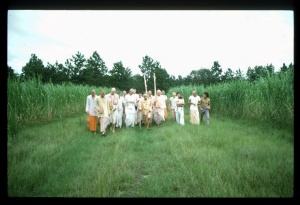CC Adi 17.159: Difference between revisions
m (1 revision(s)) |
(Vanibot #0054 edit - transform synonyms into clickable links, which search similar occurrences) |
||
| (One intermediate revision by one other user not shown) | |||
| Line 1: | Line 1: | ||
{{ | [[Category:Sri Caitanya-caritamrta - Adi-lila Chapter 17|C159]] | ||
<div style="float:left">'''[[Sri Caitanya-caritamrta|Śrī Caitanya-caritāmṛta]] - [[CC Adi|Ādi-līlā]] - [[CC Adi 17|Chapter 17: The Pastimes of Lord Caitanya Mahāprabhu in His Youth]]'''</div> | |||
<div style="float:right">[[File:Go-previous.png|link=CC Adi 17.158|Ādi-līlā 17.158]] '''[[CC Adi 17.158|Ādi-līlā 17.158]] - [[CC Adi 17.160|Ādi-līlā 17.160]]''' [[File:Go-next.png|link=CC Adi 17.160|Ādi-līlā 17.160]]</div> | |||
{{CompareVersions|CC|Adi 17.159|CC 1975|CC 1996}} | |||
{{RandomImage}} | |||
==== TEXT 159 ==== | ==== TEXT 159 ==== | ||
<div | <div class="verse"> | ||
prabhu kahe,—vede kahe go-vadha niṣedha | :prabhu kahe,—vede kahe go-vadha niṣedha | ||
ataeva hindu-mātra nā kare go-vadha | :ataeva hindu-mātra nā kare go-vadha | ||
</div> | </div> | ||
| Line 12: | Line 16: | ||
==== SYNONYMS ==== | ==== SYNONYMS ==== | ||
<div | <div class="synonyms"> | ||
prabhu | ''[//vanipedia.org/wiki/Special:VaniSearch?s=prabhu&tab=syno_o&ds=1 prabhu] [//vanipedia.org/wiki/Special:VaniSearch?s=kahe&tab=syno_o&ds=1 kahe]'' — the Lord replied; ''[//vanipedia.org/wiki/Special:VaniSearch?s=vede&tab=syno_o&ds=1 vede]'' — in the ''Vedas''; ''[//vanipedia.org/wiki/Special:VaniSearch?s=kahe&tab=syno_o&ds=1 kahe]'' — is enjoined; ''[//vanipedia.org/wiki/Special:VaniSearch?s=go&tab=syno_o&ds=1 go]-[//vanipedia.org/wiki/Special:VaniSearch?s=vadha&tab=syno_o&ds=1 vadha]'' — cow-killing; ''[//vanipedia.org/wiki/Special:VaniSearch?s=niṣedha&tab=syno_o&ds=1 niṣedha]'' — prohibition; ''[//vanipedia.org/wiki/Special:VaniSearch?s=ataeva&tab=syno_o&ds=1 ataeva]'' — therefore; ''[//vanipedia.org/wiki/Special:VaniSearch?s=hindu&tab=syno_o&ds=1 hindu]'' — Hindu; ''[//vanipedia.org/wiki/Special:VaniSearch?s=mātra&tab=syno_o&ds=1 mātra]'' — any; ''[//vanipedia.org/wiki/Special:VaniSearch?s=nā&tab=syno_o&ds=1 nā]'' — does not; ''[//vanipedia.org/wiki/Special:VaniSearch?s=kare&tab=syno_o&ds=1 kare]'' — execute; ''[//vanipedia.org/wiki/Special:VaniSearch?s=go&tab=syno_o&ds=1 go]-[//vanipedia.org/wiki/Special:VaniSearch?s=vadha&tab=syno_o&ds=1 vadha]'' — cow-killing. | ||
</div> | </div> | ||
| Line 19: | Line 23: | ||
==== TRANSLATION ==== | ==== TRANSLATION ==== | ||
<div | <div class="translation"> | ||
Refuting the Kazi’s statement, the Lord immediately replied, “The Vedas clearly enjoin that cows should not be killed. Therefore every Hindu, whoever he may be, avoids indulging in cow-killing. | Refuting the Kazi’s statement, the Lord immediately replied, “The Vedas clearly enjoin that cows should not be killed. Therefore every Hindu, whoever he may be, avoids indulging in cow-killing. | ||
</div> | </div> | ||
| Line 26: | Line 30: | ||
==== PURPORT ==== | ==== PURPORT ==== | ||
<div | <div class="purport"> | ||
In the Vedic scriptures there are concessions for meat-eaters. It is said that if one wants to eat meat, he should kill a goat before the goddess Kālī and then eat its meat. Meat-eaters are not allowed to purchase meat or flesh from a market or slaughterhouse. There are no sanctions for maintaining regular slaughterhouses to satisfy the tongues of meat-eaters. As far as cow-killing is concerned, it is completely forbidden. Since the cow is considered a mother, how could the Vedas allow cow-killing? Śrī Caitanya Mahāprabhu pointed out that the Kazi’s statement was faulty. In the Bhagavad-gītā ([[BG 18.44]]) there is a clear injunction that cows should be protected: kṛṣi-gorakṣya-vāṇijyaṁ vaiśya-karma svabhāva-jam. “The duty of vaiśyas is to produce agricultural products, trade and give protection to cows.” Therefore it is a false statement that the Vedic scriptures contain injunctions permitting cow-killing. | In the Vedic scriptures there are concessions for meat-eaters. It is said that if one wants to eat meat, he should kill a goat before the goddess Kālī and then eat its meat. Meat-eaters are not allowed to purchase meat or flesh from a market or slaughterhouse. There are no sanctions for maintaining regular slaughterhouses to satisfy the tongues of meat-eaters. As far as cow-killing is concerned, it is completely forbidden. Since the cow is considered a mother, how could the ''Vedas'' allow cow-killing? Śrī Caitanya Mahāprabhu pointed out that the Kazi’s statement was faulty. In the [[Bhagavad-gita As It Is (1972)|''Bhagavad-gītā'']] ([[BG 18.44 (1972)|BG 18.44]]) there is a clear injunction that cows should be protected: ''kṛṣi-gorakṣya-vāṇijyaṁ vaiśya-karma svabhāva-jam''. “The duty of ''vaiśyas'' is to produce agricultural products, trade and give protection to cows.” Therefore it is a false statement that the Vedic scriptures contain injunctions permitting cow-killing. | ||
</div> | </div> | ||
__NOTOC__ | |||
<div style="float:right; clear:both;">[[File:Go-previous.png|link=CC Adi 17.158|Ādi-līlā 17.158]] '''[[CC Adi 17.158|Ādi-līlā 17.158]] - [[CC Adi 17.160|Ādi-līlā 17.160]]''' [[File:Go-next.png|link=CC Adi 17.160|Ādi-līlā 17.160]]</div> | |||
__NOTOC__ | |||
__NOEDITSECTION__ | |||
Latest revision as of 18:37, 19 February 2024

A.C. Bhaktivedanta Swami Prabhupada
TEXT 159
- prabhu kahe,—vede kahe go-vadha niṣedha
- ataeva hindu-mātra nā kare go-vadha
SYNONYMS
prabhu kahe — the Lord replied; vede — in the Vedas; kahe — is enjoined; go-vadha — cow-killing; niṣedha — prohibition; ataeva — therefore; hindu — Hindu; mātra — any; nā — does not; kare — execute; go-vadha — cow-killing.
TRANSLATION
Refuting the Kazi’s statement, the Lord immediately replied, “The Vedas clearly enjoin that cows should not be killed. Therefore every Hindu, whoever he may be, avoids indulging in cow-killing.
PURPORT
In the Vedic scriptures there are concessions for meat-eaters. It is said that if one wants to eat meat, he should kill a goat before the goddess Kālī and then eat its meat. Meat-eaters are not allowed to purchase meat or flesh from a market or slaughterhouse. There are no sanctions for maintaining regular slaughterhouses to satisfy the tongues of meat-eaters. As far as cow-killing is concerned, it is completely forbidden. Since the cow is considered a mother, how could the Vedas allow cow-killing? Śrī Caitanya Mahāprabhu pointed out that the Kazi’s statement was faulty. In the Bhagavad-gītā (BG 18.44) there is a clear injunction that cows should be protected: kṛṣi-gorakṣya-vāṇijyaṁ vaiśya-karma svabhāva-jam. “The duty of vaiśyas is to produce agricultural products, trade and give protection to cows.” Therefore it is a false statement that the Vedic scriptures contain injunctions permitting cow-killing.